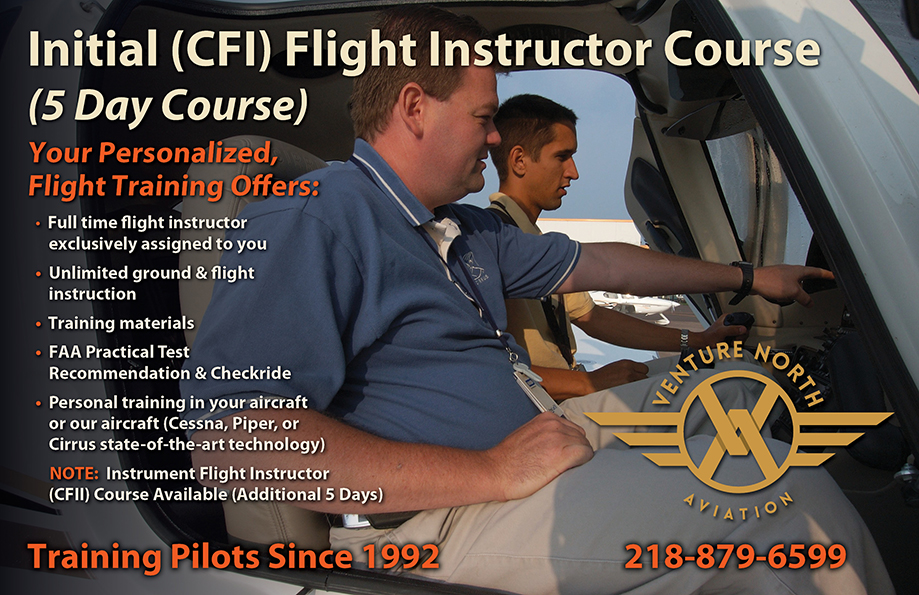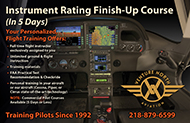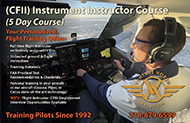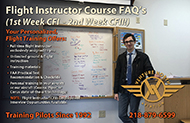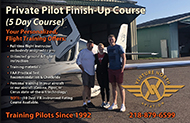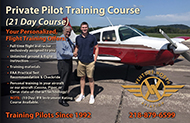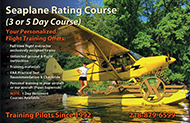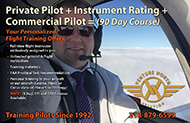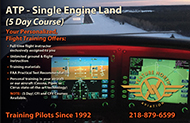(5 Day) Flight Instructor (CFI) Course
The Flight Instructor (CFI) Course is designed to immerse the Commercial Pilot into a dedicated accelerated flight instructor training program. The flight instructor CFI course is 5 days in length. The Flight Instructor course program includes the initial CFI Flight Instructor practical test reccomendation with an FAA Certified Flight Instructor.
Train the way you Fly - Fly the way you train
CFI Course Includes:
- Flight Instructor Exclusively Assigned to You
- Unlimited Flight Instruction
- Training Materials
- FAA Practical Test Recommendation - (Budget FAA Examiner Fees & additional days of stay if scheduled locally for a test.)
- Call for pricing - (in your plane)
- Call for pricing - (in our planes) PA-28-181 Piper Archers LX G1000 NXI, PA-28-151 Piper Warrior with G5's and Garmin 375's, GPS Garmin 430 WAAS, Cirrus SR22 G3 Perspective/ GPS WAAS or Cirrus SR22 Avidyne / GPS Garmin 430 WAAS, CE-172 GPS 430 WAAS
- Note: Course, pricing, flight and ground instruction can be customized to individual needs
- Note: Hotel & housing available
- Note: Rental vehicle transportation available
- Note: CFI flight training at our location
- Contact Us At: 218-879-6599 for Course Scheduling
CFI Course Prerequisites:
For pilots seeking an Flight Instructor rating; come prepared with the following information.
CFI Training Course Topics Include:
- Fundamentals of Flight Instruction
- CFI Technical Subject Matter
- Preflight Preparation
- Preflight Lesson on a Manuever To Be Performed In Flight
- Airport and Seaplane Base Operations
- Takeoffs, Landings and Go-Arounds
- Fundementals of Flight
- Performance Manuevers
- Ground Reference Maneuvers
- Slowflight, Stalls and Spins
- Basic Instrument Maneuvers
- Emergency Operations
- Postflight Procedures
- AC-61.65
- Risk Management
- Aeronautical Decision Making
- Task Management
- Single Pilot Resource Management
- Scenario Based Training
- Personal Minimums
- Flight Planning
- ATC System & Communications
- Safe and efficient operation of aircraft
- Weight and balance computations
- Use of performance charts
- Effects of exceeding aircraft performance limitations
- Aeronautical charts and a magnetic compass for pilotage and dead reckoning
- Use of air navigation facilities
- Aeronautical decision making and judgment
- Principles and functions of aircraft systems
- Maneuvers, procedures, and emergency operations appropriate to the aircraft
- Night operations
- Procedures for operating within the National Airspace System
- Teach Flight Planning
- Applicable FAR's, AIM and Advisory Circulars
- Radio Communications Procedures
- Recognition of critical weather situations from the ground and in flight, windshear avoidance, and the procurement and use of aeronautical weather reports and forecasts
- Safe and efficient operation of aircraft, including collision avoidance, and recognition and avoidance of wake turbulence
- Effects of density altitude on takeoff and climb performance
- Stall awareness, spin entry, spins, and spin recovery techniques for the airplane
- Preflight action that includes—How to obtain information on runway lengths at airports of intended use, data on takeoff and landing distances, weather reports and forecasts, and fuel requirements
Accelerated Flight Training
- 10 Day Instrument Rating Course
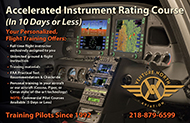
- 5 Day Instrument Rating - Finish Up
- 5 Day Commercial Pilot Course
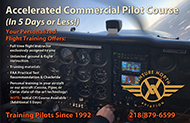
- 5 Day Commercial Multi-Engine Add-On Course
- 5 Day Initial Flight Instructor (CFI) Course
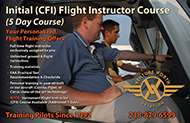
- 5 Day Instrument Flight Instructor (CFII) Course


